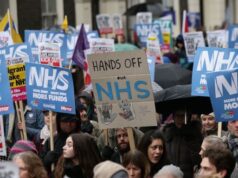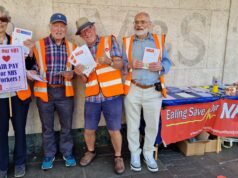With no spare hospital beds, hospital doctors, GPs, consultants, nurses or support staff of all types – the NHS is ill-prepared for any unexpected spike in illnesses – never mind one based on a new virus with no vaccine. With Local Authorities having been starved of funds over the last 10 years, the level of Public Health services available locally is akin to a small plaster failing to stem the blood from a major gushing wound. Mental Health and Social Care services (in Ealing for example) can hardly cope now, so sadly if the epidemic strikes hard, suicides, self-harm and paranoia will ramp up.
Given the worst case – and following Japan’s and Italy’s policy – all schools in England could close down. People may be loathe to travel on planes, tube trains, trains or even to leave their homes. In fact the tube and bus networks could be shut down. Industry and commerce could slow down considerably.
Bringing aged ex-NHS staff out of retirement might be useful or in fact practical in a few cases but maybe bigger challenges will be staffing levels, the financial viability of care homes /nursing homes and palliative care (80+% private) and sustainable care for the elderly infirm.
However all this could be scare mongering. The shape and size of the Coronavirus impact on the upcoming budget might panic people or might be seen as Coronavirus a convenient excuse for more austerity.
Collaboration of NHS North West London (NWL) Clinical Commissioning Groups (CCGs) Meeting on 20 February 2020
31 NHS executives crammed themselves into too small a room in Uxbridge. Some 10 or so members of the public just squeezed into the back of the meeting. This informal, non-statutory group spent almost two hours mostly listening, but sometimes discussing, NHS NWL issues. The issues included assurance, strategic objectives, planning, quality and finance. These folks are loosely responsible for £3+ billions to be spent 1 April 2020 to end March 2021 on healthcare and social care services for over two million people. Also discussed was the commissioning of a paediatric glucose monitoring system diabetes Type 1 children’s device. This discussion topic seems as unlikely as discussing the colour of the shoes of the accused in a murder trial.
Some surprising ‘facts’ emerged:
+ NHS NWL says its Long Term Plan (LTP) will not require sign off by NHS England/NHS Improvement (NHSE/I). This is very hard to believe. It’s still in draft form some 14 months since the national LTP was published. With 2012 NHS NWL Shaping a Healthier Future (SaHF) abandoned a year ago and the 2016 NHS NWL Sustainability & Transformation Plan side-lined by the 2019 national LTP, surely NHS NWL is currently ‘flying blind’.
+ Dr Penny Dash, newly crowned head of the NHS NWL integrated Care System (ICS), has apparently already begun attending NHS NWL meetings. One wonders whether she is still the European healthcare boss of McKinsey & Co. Apparently she will soon begin to work part-time for NHS NWL and will curtail ‘most of her interests in McKinsey & Co’. This casual indifference to conflict of interest is only compounded by the knowledge that NHS NWL paid McKinsey & Co £34,680,896 million (up to November 2017 on public record) for management consultancy advice on the disastrous 2012 – 2019 NHS NWL SaHF project. The fact that the formal NHS NWL ICS supremo role only becomes ‘live’ (albeit informally) on 1 April 2021 just seemed to be lost on the 31 senior NHS NWL executives present.
+ There is no development plan for Ealing Hospital. I know this as I specifically asked this question. Outgoing NHS NWL Accountable Officer Mark Easton passed on the question and handed over to Dr Mohini Parmar, ECCG Chair. Her answer was quite forgettable waffle.
+ The only NHSE capital grants are for building works at Hillingdon and St Mary’s Hospitals. (On 10 February 2019 the ‘Sunday Times’ estimated the combined urgent repair bills for these two hospitals was £309 million.)
+ The ECCG Managing Director failed to appear at this meeting. This was the third consecutive public meeting /meeting in public she has failed to attend. At none of these meetings was any explanation forthcoming for her absence. As she costs the public purse some £150,00/year surely some clues about her absence are in order.
Johnson Admits He Has No Plan for Social Care
The Prime Minister’s big lies continue in the care sector. Johnson famously attached himself to the infamous ‘£350 million per week for the NHS when we leave the EU’ mantra in 2016. Even more recently his free car parking in NHS hospitals is turning out not to be a universal truth either.
Matt Hancock MP, Secretary of State for Health and Social Care, has recently written to all MPs and Peers in the House of Lords wanting views re social care to be shared. This is really quite ‘rich’ given the failed promises of a Government Green Paper/White Paper/any coloured paper stretch back over two years with six failed publication dates.
Worryingly social care statistics include:
+ 122,000 staff vacancies
+ 1.4 million people going without any care
+ 143,000 older people face catastrophic lifetime costs of £100,000 or more
+ Local Authority bosses predict the funding gap for services of almost £6.5 billion by 2025.
The Government, clearly now desperate, is seeking cross-party talks to tackle the social care crisis – but not until May 2020!
NHS North West London’s EPIC ‘Fiddles While Rome Burns’
‘Engage Participate Involve Collaborate’- EPIC – is NHS NWL’s latest time and money waster. EPIC self-describes itself as ‘leading edge, paradigm-shifting approach to resident engagement’. It’s quite worrying to imagine that NHS bosses actually believe this to be true.
A 6 March 2020 NHS NWL paper presented at the North West London Joint Health Overview Scrutiny Committee Meeting on 9 March 2020 in Twickenham treats us to 2,500+ words on this NHS England £10,000 grant funded initiative. Launched in December 2019, EPIC is a 12-15 month programme. At its heart are 4,000 residents who have been chosen as a representative sample of residents/patients across the 2+ million in north west London. Not only is this group to be used as a ’sounding board’ for NHW NWL commissioning and service delivery process changes/improvements, EPIC expects it to ’co-produce’ them. Astonishing. No doubt some of the 17 or so public relations staff still employed at NHS NWL are beavering away on EPIC.
Dubious EPIC ‘Partners’
One big ‘own goal’ in EPIC is the major role given to Healthwatch. In Ealing and Hounslow Healthwatch is a busted flush as their secondary paymasters are their local CCGs. You just can’t hold NHS institutions to account if they are paying you money. Healthwatches across England are also compromised in attempting to hold public health, social care and integrated healthcare and social care services to account as their primary paymasters are their Local Authorities.
Another bloomer is employing the Consultation Institute (CI). I visited them in Peterborough in 2013. They are an interesting bunch but their credibility was completely blown when they ‘blessed’ the seriously flawed 2012 NHS NWL ‘Shaping a Healthier Future’ engagement and public consultation process.
And let’s not use language sloppily. Healthwatch and the CI are just hired hands in EPIC.
NHS NWL Engagement and Public Consultation Track Record 2012 to 2019
Frankly this has been very poor. Campaigning groups did their research, analysis and trumpeting over and over again (2012-2019) about the flawed nature of SaHF but were consistently ignored. The question must be then – will EPIC improve on this? In 2019 NHS NWL produced its draft NHS NWL Long Term Plan (LTP). Ealing Save Our NHS (ESON) produced surely one of the most detailed critiques of the draft LTP. ESON summitted this 2,400+ word document to NHS NWL in October 2019. As of 10 March 2020, ESON had received no response from NHS bosses. So much for engagement and public consultation. So much for ’dialogue’ which EPIC bangs on about.
Motherhood and Apple Pie
+ Audit of public engagement
+ Learn and build on existing good practice
+ Involvement Charter
+ Community voices
These are surely just displacement activities, when in fact there has been no meaningful engagement; there are no examples of good practice; the charter will have no teeth; and the existing knowledgeable community voices are being ignored by EPIC and are being excluded from EPIC.
ESON, Brent Patient Voice and Hammersmith & Fulham Save our NHS have all had their applications to join EPIC ignored (rejected?). Activist members of these groups have been researching, writing and campaigning on behalf of their residents for eight years. For EPIC to ignore them completely devalues the ‘paradigm-shifting’ approach.
Reality Check
In NHS NWL there are chronic shortages of doctors, nurses, consultants and support workers of all types. There are major shortages of hospital beds. Mental health and social care services are very thin on the ground.
It is almost too insulting for words to contemplate a horde of NHS NWL public relations folks spending public money ‘prosecuting’ EPIC when the debt levels and consequent cost cutting activities across the region – in commissioning and in service delivery – are immense. Never mind the, at best, enormous pressures Coronavirus will place on primary, secondary, community healthcare, public health and social care services.
I plan to gate-crash the next EPIC meeting on 1 April 2020 – that is assuming that NHSE/DHSC allows the meeting to go ahead.
In reviewing EPIC I must declare an interest. From 1983 to 2004 I ran my own public relations company in what is now called the Tech industry.
500,000 Police Call-Outs to Deal With Mental Health Issues in 2019
Think tank Parliament Street has disclosed that the Police’s dealing with mental health incidents has increased by 20% since 2016. The Metropolitan Police force recorded the highest call-out numbers at 39,584. This works out at over 100 call-outs every day in London in 2019. For years the Police have been pleading that they should not be the ones to be first responders for mental health problems.
NHS England (NHSE) Hires UnitedHealth for £7 Million to ‘Rank’ Patients
The ‘Daily Mirror’ (23 February 2020) published this story. UnitedHealth of America is a $242 billion revenue private healthcare company. NHSE has asked UnitedHealth to rank patients into high, medium and low risk groups. It’s a nine month programme operating in Dorset, Berkshire, Cumbria, Lancashire and Leeds. Ranking patients in terms of illness is common practice in the USA. In fact UnitedHealth ranks/assesses patients for America’s insurance-led system.




